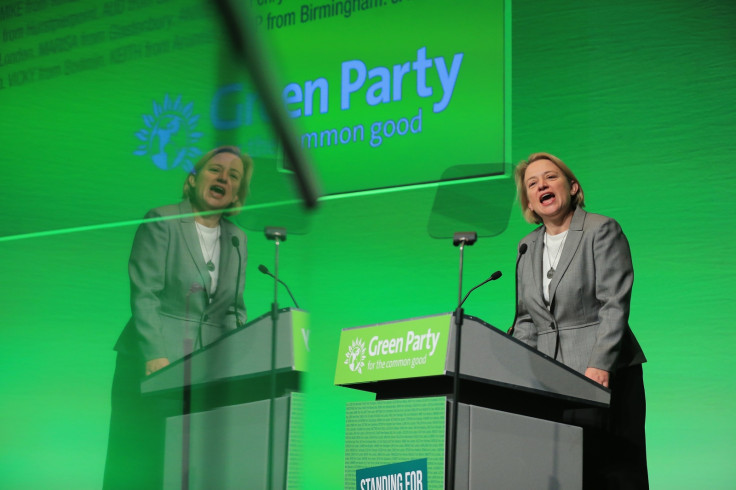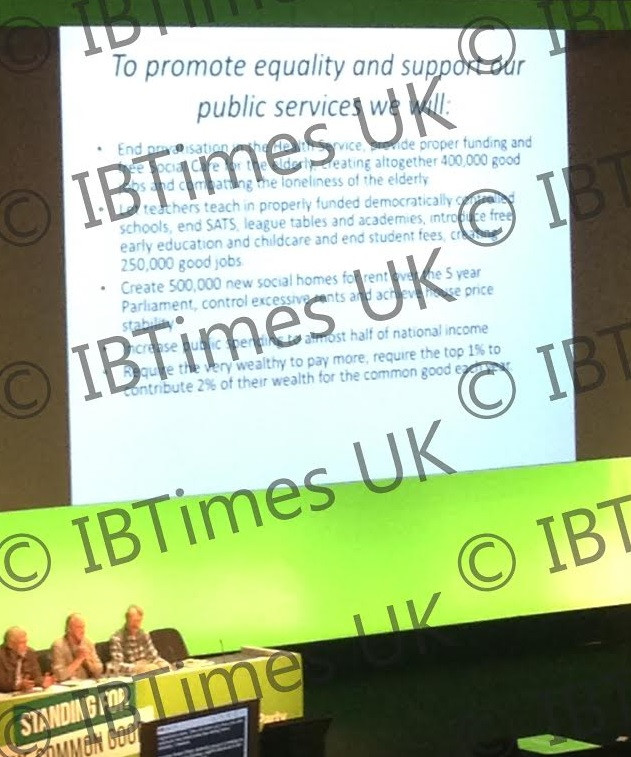Green Party manifesto plans 'fearsome' tax offer to increase public spending to 46% of GDP

A Green government would introduce a "fearsome" tax offering to increase public spending to up to 46% of GDP, according to the authors of the party's election manifesto.
Brian Heatley and Andy Dobson, researchers at the Green House think tank and architects of the document, gave a preview of the manifesto to party members at the Green Party spring conference in Liverpool.
The document is due to be launched at the end of March but IBTimes UK obtained a recording and pictures of the authors' presentation.
Heatley explained the manifesto would have a "great deal" on the NHS and the party's campaign literature would focus on the health service.
The former civil servant said the party wants to emphasise "practical things that will affect people" as well as pledging to put another £10bn ($15bn, €13.9bn) "straight into the NHS".

The academic restated Natalie Bennett's pledge that the Greens would introduce free social care for the over-65s, which the Green leader argued would make the UK a more "decent, humane and caring" country.
Heatley also revealed the left-wing party would seek to "achieve house price stability" and make the buy-to-let market "very much less attractive".
"We want to try and restore housing economically to what it is – housing. One way of doing that will be making the buy-to-let market very much less attractive," he said.
"We think buy-to-let landlords should not be able to charge the interest they pay on their mortgage against their profits, which would make it much less attractive to do, but also combining that with rent controls and decent tenancy agreements."
The proposal would go alongside the Greens' promise to build 500,000 new social-rent homes by 2020 at a cost of £2.7bn.
Heatley admitted the package of reforms would "cost a lot of money" and revealed the Greens would increase public spending by up to 46% of the UK's GDP.
He said: "The current government are planning to reduce public spending over the next five years to 36% of GDP. At the moment, it's about 40%. We plan to increase public spending. It's coming out now at about 45% to 46%. That's not wired in international terms, there are plenty of countries that spend more.
"To do that there's a fearsome offer on tax because the government is only raking in about 37% of GDP in tax at the moment and we're going to make up quite a lot of the gap. But we won't make up all of the gap, we don't make a fetish of it."
'Aspirational and inspiring'

The "fat" manifesto will also "very sensibly" propose increasing child benefit for a first child from £20.50 a week to about £50, according to Heatley.
In addition, the authors said each chapter of the document will open with a thought experiment, asking the reader what the world would look like if the Green Party was in charge. Dobson said he made this move to make the document to be "aspirational and inspiring".
The professor of politics at Keele University also revealed there will be a "policy on a page" section at the start of the manifesto.
"The idea is that we've tried to summarise the manifesto on that one page. If you are looking at a page to carry around with you, that's probably the right one to carry around," he told attendees.
The document focuses on three "connected crises" throughout, including an "unstable, unsustainable economy" that is "ruining the planet"; "Victorian levels" of poverty and inequality and a "squalid" political system.
The authors also said they hope to make the manifesto much more "web-friendly" and put links into it so readers can navigate the document easily.
The Green manifesto will come after deputy leader Amelia Womack revealed the Greens would abolish student tuition fees.
The proposal means undergraduates from the European Union (EU), considered "home students", would not have to pay tuition fees in England and Wales, a spokesman told IBTimes UK.
But Tom Sharman, policy communications manager for the Greens, said the party was "still looking into the detail" of whether students from outside of the EU would have to pay tuition fees.
© Copyright IBTimes 2025. All rights reserved.






















